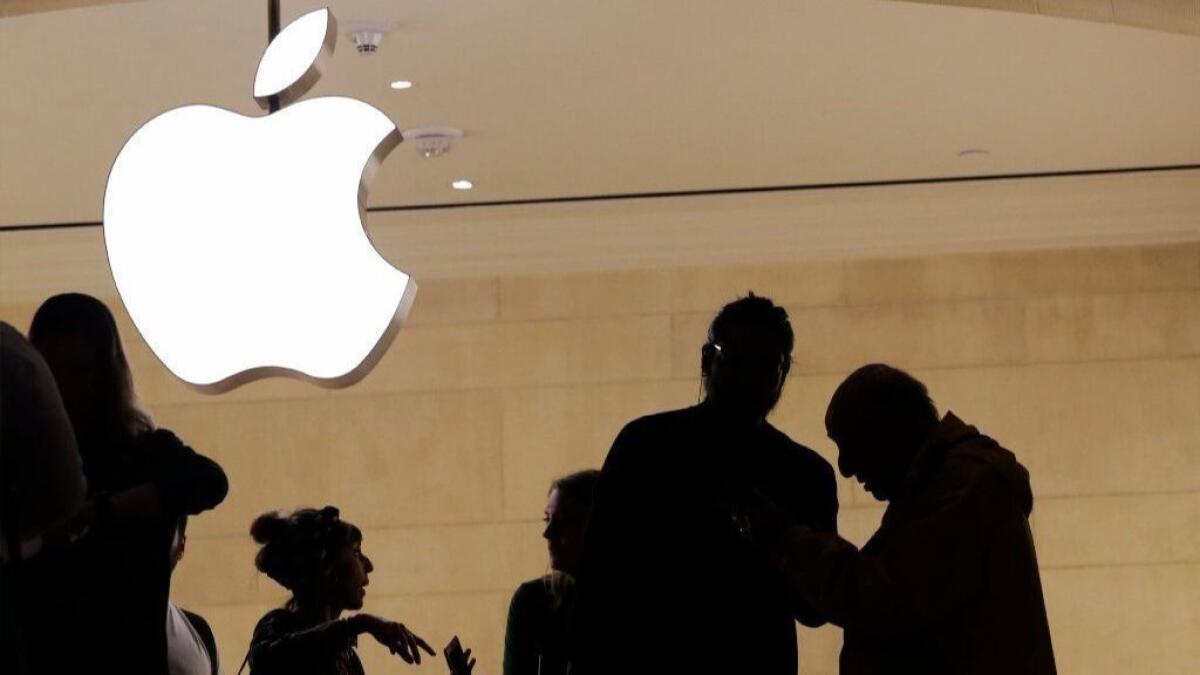Just how much might Apple owe you for inflating the price of iPhone apps?

- Share via
A divided Supreme Court ruled Monday morning that iPhone users can sue Apple for allegedly abusing its control over iPhone app sales to inflate the price of those ubiquitous nuggets of software. In doing so, however, the justices left open the vexing question of how to calculate the damage Apple inflicted on its customers.
That question appears to have been the reason the court split, with rookie Justice Brett M. Kavanaugh joining the court’s four Democratic appointees in the majority. The issue before the court was whether federal antitrust law and Supreme Court precedents allow consumers to sue Apple for alleged price gouging even though Apple doesn’t set the price for the apps sold through the App Store.
But “apps sold through the App Store” is redundant, isn’t it? Apple doesn’t allow iPhone apps to be sold anywhere but its App Store; only those apps can be loaded onto an iPhone without circumventing the operating system. And circumventing the operating system not only voids the Apple warranty, it also has the potential to turn one’s extremely expensive smartphone into a non-functional monument to one’s appetite for risk.
That’s the heart of the antitrust case against Apple, and the court didn’t rule on the merits of that claim. Instead, it dealt only with Apple’s motion to have the price-gouging lawsuit brought by an iPhone user named Robert Pepper and three other consumers thrown out because they weren’t “direct purchasers” injured by the alleged monopolistic behavior.
Enter the Fray: First takes on the news of the minute »
The 9th U.S. Circuit Court of Appeals rejected Apple’s argument, as did the Supreme Court’s majority. It seems obvious that consumers purchase apps directly from Apple — the company decides what’s available, collects the payments and delivers the software merchandise. And Apple imposes what amounts to a 30% tax and an annual membership fee on app developers, so it’s fair to assume that consumers are paying more for apps than they might if they could buy them from the developers’ websites.
But how much more? Apple doesn’t allow prices that end in anything other than .99, so it’s well-nigh impossible for a developer to pass along Apple’s 30% tax precisely. It’s also conceivable that they’re simply swallowing the Apple tax, as Justice Neil M. Gorsuch wrote in the dissenting opinion.
The real victim of Apple’s behavior, the dissenters argued, are app developers. By allowing consumers to sue as well as developers, Gorsuch wrote, the court’s majority may be forcing courts to answer a highly speculative question — just how much of Apple’s 30% tax was passed on to consumers — while also raising the possibility that Apple would have to pay twice (to consumers and to developers) for the same injury.
Ugh. How is a court supposed to divine how much a developer would have charged for an app had it been able to sell it on marketplaces other than the App Store?
But that’s really a problem for consumers who might want to sue Apple, not for the folks in black robes. Would-be plaintiffs will have to come up with a way not just to prove that Apple’s behavior was illegal and that they were damaged, but also to quantify that damage.
Good luck with that. Yet I think Kavanaugh’s argument is stronger than Gorsuch’s. If the court didn’t allow consumers to sue Apple, they would have no recourse at all — the app developers aren’t the alleged monopolists here. Yes, developers are arguably more injured than consumers are, but it’s still hard to imagine that Apple’s 30% tax isn’t costing the people who buy at the App Store. And that situation exists only because Apple forces people to shop there if they want to use the smarts in their smartphone.
More to Read
A cure for the common opinion
Get thought-provoking perspectives with our weekly newsletter.
You may occasionally receive promotional content from the Los Angeles Times.










